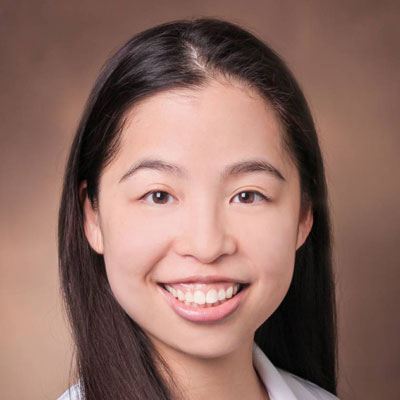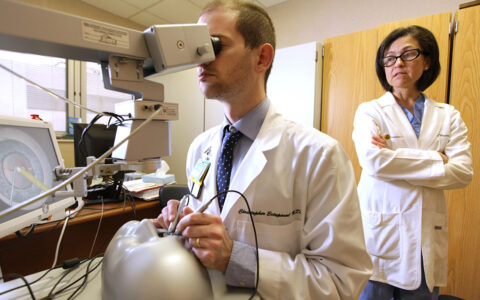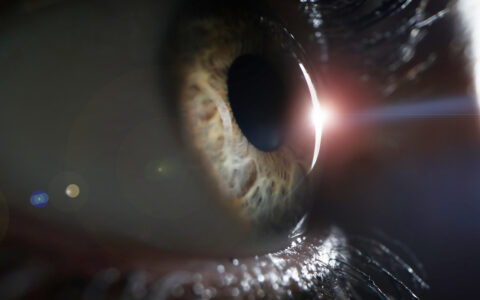Surgeons at Vanderbilt Eye Institute are collaborating across ophthalmology subspecialties to reverse limbal stem cell deficiency (LSCD) in pediatric patients who present with this complex eye condition.
LSCD can arise from congenital conditions like aniridia or acquired conditions such as trauma to the eye, resulting in impaired vision or even blindness. In recent years, limbal stem cell transplants (LSCT) have emerged as a successful treatment that can restore a patient’s vision.
“Limbal stem cell transplantation offers real hope for patients with limbal stem cell deficiency,” said Christine Shieh, M.D., a cornea specialist and assistant professor in the Department of Ophthalmology and Visual Sciences at Vanderbilt. “For many of my patients, I am often the second or third eye doctor that they have consulted, and their limbal stem cell deficiency has already affected their vision.”
“For many of my patients, I am often the second or third eye doctor that they have consulted, and their limbal stem cell deficiency has already affected their vision.”
The Case for LSCT
LSCD may lead to persistent or recurrent epithelial defects, neovascularization, and subsequent cornea scarring. In addition to decreased vision, the patient also may experience significant light sensitivity or pain.
If the cornea’s central visual axis is clear, Shieh says, physicians usually seek to manage the patient medically. Medical management may include anti-inflammatory prescription eye-drops to help control inflammation, preservative-free tears or punctal plugs to help the tear film, and serum tears or scleral contact lenses to promote the health of the epithelium.
Shieh may turn to systemic immunosuppression when topical anti-inflammatory drops are insufficient to control the disease. She acknowledges she is lucky to have uveitis colleague Sapna Gangaputra, M.D., to help initiate immunosuppression. Their protocols have roots in uveitis treatment regimens, and will sometimes involve collaboration with Vanderbilt pediatric rheumatologists.
Surgical Considerations
If the cornea’s central visual axis has developed scarring leading to loss of vision, surgical intervention is discussed with parents. There are several types of LSCT, and the method utilized will depend upon factors including the cause of the LSCD and whether it is unilateral or bilateral; the patient’s overall systemic health; and whether the donor material is from a healthy fellow eye, a living relative or a donor bank.
Shieh notes that when the donor source is allogenic, systemic immunosuppression is needed to prevent rejection. For pediatric transplant patients requiring allogeneic LSCT she turns to Kathy Jabs, M.D., division chief of pediatric nephrology at Vanderbilt, to help initiate and manage systemic immunosuppression.
A Novel Team Approach
Often, especially with trauma or congenital lesions, the eyelids are involved. Shieh partners closely with Louise Mawn, M.D., professor of ophthalmology and neurosurgery at Vanderbilt. “Any eyelid abnormalities need to be addressed before limbal stem cell transplantation so that the transplanted stem cells can thrive. Dr. Mawn is an internationally-renowned oculoplastics expert, and I am fortunate to have her expertise in helping these complex pediatric patients,” Shieh said.
“Any eyelid abnormalities need to be addressed before LSCT so that the transplanted stem cells can thrive.”
Shieh and Mawn often work together as part of a multidisciplinary team with other Vanderbilt Eye Institute faculty. They recently collaborated with Karen Joos, M.D., Joseph and Barbara Ellis Professor of Opthalmology; and Sean Donahue, M.D., Sam and Darthea Coleman Professor of Pediatric Opthalmology, in caring for an infant born with visually-obstructing congenital lesions who needed several surgeries, including LSCT, optical iridectomy, and surgery to correct strabismus.
“We’re very fortunate to have such tremendous collaboration and combined expertise in the Vanderbilt team so that we can offer pediatric patients highly personalized treatment,” Shieh said.





